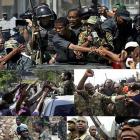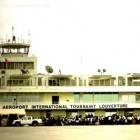ADVERTISEMENT
coup
Port-au-Prince police chief, Col. Joseph Michel Francois
Col. Joseph Michel Francois was Chief of National Police of Haiti from 1991 to 1994 at a time when Haitian police was technically part of the army. He participated in the 1991 Haitian coup d'état that ousted President Jean-Bertrand Aristide.
Investigation reveals that Joseph Michel Francois built a vast network of independent intelligence service, with the responsibilities to intimidate and sometimes eliminate rivals and opponents.
He also collaborated in shipping tons of cocaine to the United States in the 1980's from his private airstrip in Haiti.
Himmler Rebu unsuccessful coup d'etat against Prosper Avril
Himmler Rebu unsuccessful coup d'etat against Prosper Avril
In april, 1989, Rebels surrendered control of Port-au-Prince's airport. It was later found out that Haiti was once again in a middle of a Coup D'Etat. Lt. Col. Himmler Rebu, commander of the Leopards Battalion, Col. Phillipe Biamby and Col. Leonce Qualo were given safe passage to the United States.
Three army officers who tried to overthrow the country's leader, Lt. Gen. Prosper Avril were arrested but later, they were driven by military escort to the Dominican border on their way to the United States on April 4, 1989. These three officers were Lt. Col. Himmler Rebu (38 years old in 1989), commander of the Leopards Battalion; Col. Phillipe Biamby (36), commander of the presidential guard, and Col. Leonce Qualo (35), an administrative officer at army headquarters. Some loyal soldiers of Lt. Gen. Prosper Avril rescued the Lt. General as he was being driven away to be deported. General Avril's wife, Marie-Ange, and her mother were taken captive during the coup with the general, but were released within an hour. The government freed these three soldiers of the failed coup attempt from prison as it bowed to pressure from the mutinous soldiers who held General Avril's one of the four sons as hostage. These three army officers were associated with Jean-Claude Duvalier before he was deposed in 1986.
Guy Philippe led 2004 coup d'état against Jean-Bertrand Aristide
Here is a picture of Guy Philippe celebrating after he led the 2004 coup d'état against Jean-Bertrand Aristide.
Guy Philippe (February 29, 1968) is a Haitian politician, former Tonton Macoutes leader and a presidential candidate (Front for National Reconstruction, a guerrilla group) in the Haitian General Election, 2006 who led the 2004 Haitian coup d'état that ousted Jean-Bertrand Aristide. Philippe was a former Haitian Police Chief, trained by U.S Special Forces in Ecuador in the early 1990s and he was once wanted by the United States for smuggling cocaine. In the year 2000, he was accused of masterminding a coup and was subsequently removed from his post as police chief of Cap-Haïtien and Philippe fled to the Dominican Republic. In February 2004, he returned from the DR, met former militia leader Louis-Jodel Chamblain to join the 2004 Haitian coup d'état against president Jean-Bertrand Aristide.
February 29, 2004, Jean-Bertrand Aristide forced into exile
These pictures show Jean Bertrand Aristide arriving at Bangui M'Poko International Airport which is an international airport located northwest of Bangui, the capital of the Central African Republic, following his second exile from Haiti.
The second set shows Jean Bertrand Aristis, his wife Mildred Aristide and their two children Christine and Michaelle Aristide arriving in South Africa where he would be allowed to live in exile until he can safely return to Haiti.
For the second coup D'Etat given to Jean Bertrand Aristide, not so much as individuals but rather countries are accused. On February 29, 2004, the US, France and Canada are accused to be the masters behind the overthrew of Jean Bertrand Aristide government.
Following several weeks of conflicts, Jean-Bertrand Aristide was ousted in a 2004 Haitian coup d'état in which one of his former soldiers (Guy Philippe) took the leading role. However, Aristide accused the U.S as one of the accomplices for orchestrating the coup d'état against him with support from Jamaican Prime Minister P. J. Patterson and countries like France, Canada and some others. On 25 February, 2004, Guy Philippe and rebel forces surrounded Port-au-Prince and announced plans to arrest Aristide. On 29 February, 2004, Aristide resigned as President and left Haiti with his wife on board a U.S. military plane to the Central African Republic. In an interview on CNN, on March 2, 2004, he said he was told to resign to avoid bloodshed. He later claimed that, his departure was a kidnapping, accusing the U.S. for orchestrating a coup d'état against him.
Haiti in Flame following Jean-Bertrand Aristide departure to Exile
Here are some pictures taken following the departure of Jean-Bertrand Aristide to Exile.
One study found that, following the departure of Aristide in 2004, about 8,000 people in Port-au-Prince alone were murdered and over 35,000 sexually assaulted. Armed rebels and angry partisans took control of half the country. In a news conference, Prime Minister Yvon Neptune said, President Aristide resigned to avoid further violence and bloodbath. We might remember that in connection with the resignation and departure of Aristide, about 44 Lavalas opponents were killed in the town of Saint-Marc. Seven people were arrested, including former Prime Minister Yvon Neptune and former Interior Minister and present interim President Jocelerme Privert. However, Yvon Neptune objected to the term 'massacre', because he considered "that was a fight between two different sides. Ramicose, which was an organization close to the opposition, fought with Bale Wouze, which was a popular organization belonging to Lavalas. Since no proper evidence was found, none of the accused was convicted.
Arnel Belizaire to take over the National Palace with 120 soldiers
Here is a picture of former Deputy Arnel Belizaire as he is thinking about taking over the National Palace with 120 soldiers
Arnel Bélizaire Wants the Popular Sector in the Provisional Government
Former MP Arnel Bélizaire does not want that the National Palace remains vacant for a long time. The former parliamentarian has appealed for 120 eligible men who would join him within 48 hours to occupy the National Palace and install a President to fill the vacuum. He does not consider this move a 'Coup', because, there is no President is in the office to drive out. This was as per the news dated February 11, 2016.
We might remember that as per government records, Arnel Bélizaire and eight other persons escaped from the National Penitentiary, the civil prison in Port-au-Prince, on 29 February 2004, 19 February 2005 and 12 January 2010. They were held in custody in connection with the "commission of crimes "and" revaluation of convicted cases, such as murder, kidnapping, rape, theft, armed robbery and conspiracy. Arnel and other eight other individuals who were accused or convicted of these charges were, Yves Jean Charles, Jean Michel, Jean Pierre Jules Rilien, Sergot Charléus, Robenson Mervil, Bourjo Jordany Dubuisson Beloved, Edzaire Bellabe, and Valdo Jean.
Victims of the Haitian Military Coup in 1991 against Jean-Bertrand Aristide
Victims of the Haitian Military Coup in 1991 against Jean-Bertrand Aristide
In the 1990's Haiti, under the leadership of Jean-Bertrand Aristide, was thrust into a worldwide political agenda that would make them a "problem" for the United States. A coup d'etat would occur in 1991 which would lead to the deaths of many of those opposed to the ousting of Aristide and the subsequent rule of the army. It would lead to two years of killings, between '91 and '93 of mass murders, for which the army officials would be granted amnesty. The carnage would continue into Aristide's second term when, in 2004, an untold number of people disappeared and were killed while the UN had control of the country.
Roger Lafontant and Ertha Pascal-Trouillot, Coup D'Etat missed
This was an attempt from former Duvalier official to take over power via a coup D'Etat. On January 6th, 1991, as president Jean Bertrand Aristide wan the post Duvalier election, a coup D'Etat was orchestrated by Roger Lafontant, a Tonton Macoute leader. Following the bloodless coup, Roger Lafontant, seized power abd declared himself president. An imposing number of the newly elected Jean Bertrand Aristide took to the streets to protest the Coup D'Etat. Several strategies were developed by the Tonton Macoute leader, Roger Lafontant, but to no avail.
The international community and the Organization of American States condemned the Coup attempt. Finally, General Herard Abraham reestablished order. It was estimated that over 75 people were killed in the violence that erupted in Port-au-Prince.
On July 31, 1991, Former Coup D'Etat mastermind Roger Lafontant was sentenced to life in prison for his attempted coup. He was killed in prison during a coup later that year.
Colonel Himmler Rebu on the resignation of Nehemie Joseph
Here is Colonel Himmler reacting on the resignation of Nehemie Joseph.
Lt. Col. Himmler Rebu, a Minister of Youth, Sports and Civic Action (MJSAC), and former commander of the Leopards Battalion believes that the resignation of electoral councilor Néhémie Joseph confirms the fact what everybody knows-- if the elections are allowed to continue, the country would lead to a catastrophe. In a letter, former Councilor Joseph had informed about several lapses which were allowed to be continued without any corrective measure. A multi-partisan group, Patriotic Resistance, a conglomeration of two dozen political parties has called for a new electoral council and has asked the transitional government to organize fair, inclusive and credible elections in Haiti. Mr. Nehemiah Joseph left the permanent electoral council because he could not comply with the selection of three electoral advisers, Patrick Metellus, Salnave Exantus and Yves Benoit Jean-Marie at the instigation of the President of CSPJ, Me Anel Alexis Joseph.
Jean Bertrand Aristide and Raoul Cedras
Here is a picture of Former Haitian President with General Raoul Cedras.
Haitian military leader Joseph Raoul Cedras was born in Jeremie and American-educated. He rose to prominence as a soldier in the Leopard Corps, trained under U.S. forces. The U.S. and France, impressed by his leadership skills, selected him to head security in Haiti's 1990-1991 state and local elections. Jean-Bertrand Aristide won his bid for the presidency and chose Cedras as Commander-in-Chief of the Haitian army, Cedras also retaining the position of Lieutenant General.
Meanwhile the U.S. was threatening to invade Haiti unless they could persuade Jonassaint to leave office. Jonassaint complied. Cedras by this point was a nationally feared figure, responsible for the massacres of 3,000-plus men, women, and children while in power.

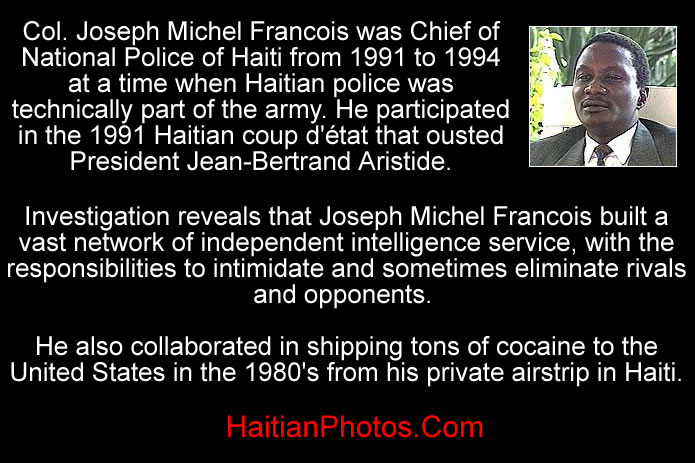
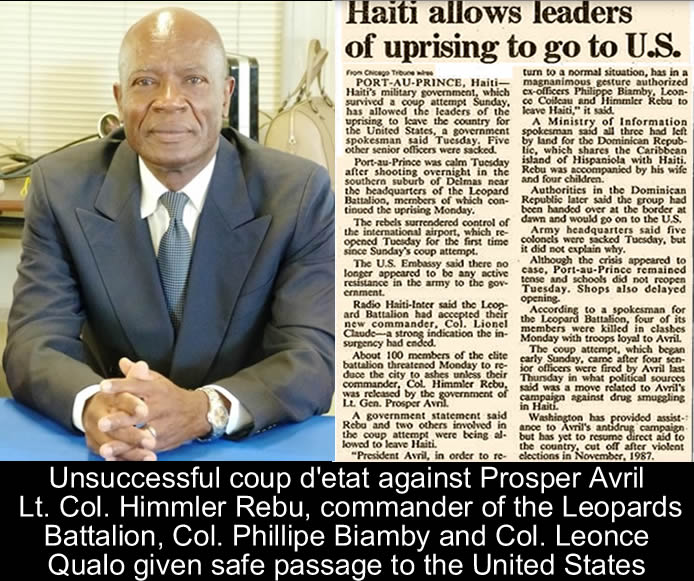
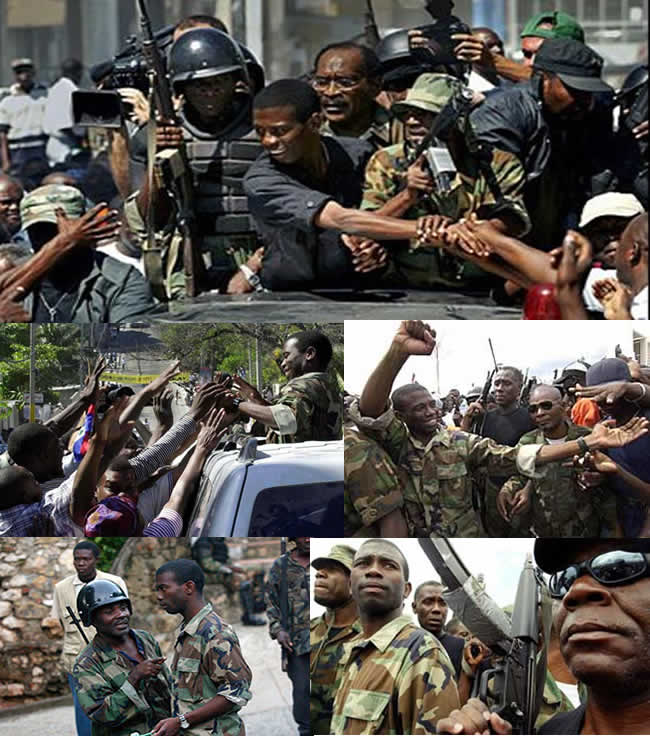


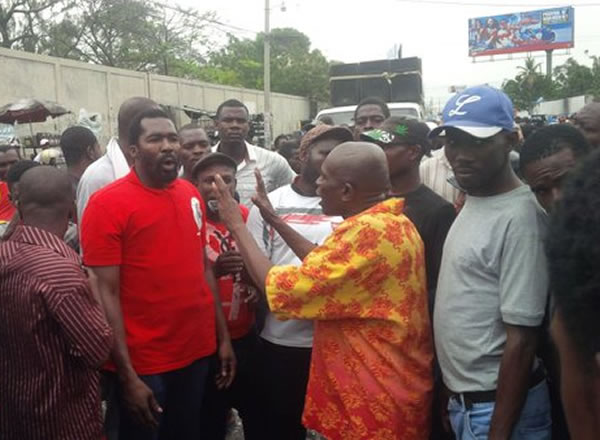
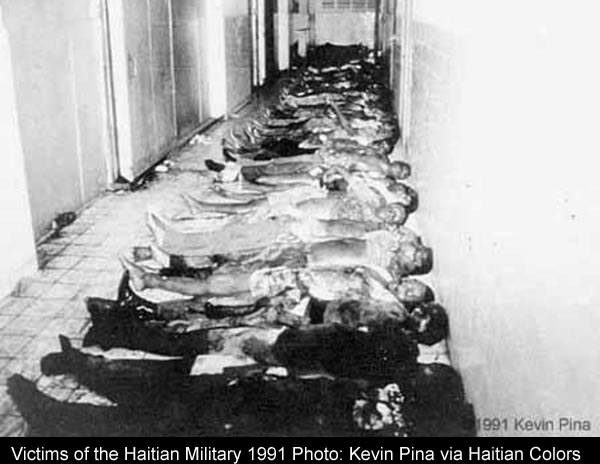
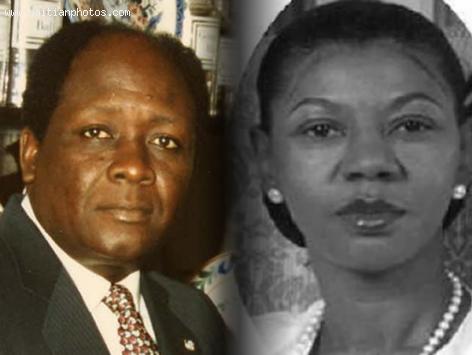
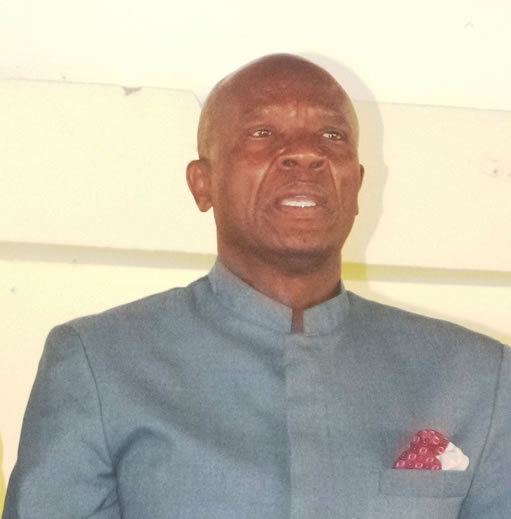
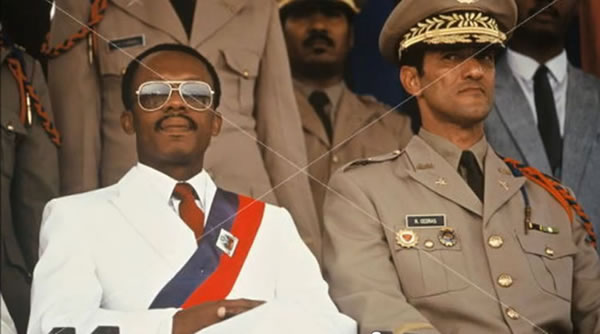
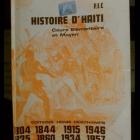 Histoire D'Haiti
Histoire D'Haiti  Hotel Beck in Cap-Haitien, Haiti
Hotel Beck in Cap-Haitien, Haiti 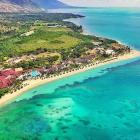 Royal Decameron Indigo and White sands
Royal Decameron Indigo and White sands  Haiti Street Food, manje kwit or Chin Janbe, for $1 or less
Haiti Street Food, manje kwit or Chin Janbe, for $1 or less  Dr. Henri Ford, First Haitian Dean At University of Miami Med...
Dr. Henri Ford, First Haitian Dean At University of Miami Med... 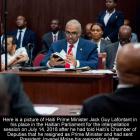 Jack Guy Lafontant resigns as Haiti Prime Minister
Jack Guy Lafontant resigns as Haiti Prime Minister  Haitiano-Japanese Naomi Osaka wins the US Open against Serena...
Haitiano-Japanese Naomi Osaka wins the US Open against Serena...  Haitians, the second largest black immigrant group in the US
Haitians, the second largest black immigrant group in the US 